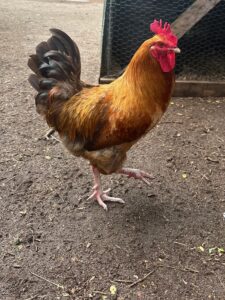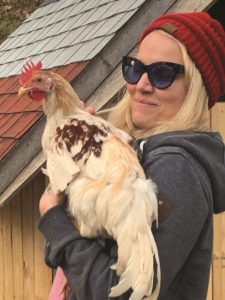ORLEANS — Residents of Hopkins Lane and Mayo Way are early risers, but it’s not by choice.

The crowing of a rooster at 39 Hopkins jolts them awake at 4 a.m. each day. While Orleans voters have adopted the state’s optional “right-to-farm” law, these neighbors are asking if that trumps their right to a good night’s sleep.
Peter Jensen, chair of the town’s agricultural advisory council, called the situation “a real boiler about to blow” after listening to complaints from neighbors who asked the panel for help at its June 10 meeting.
Teresa Izzo of 10 Mayo Way said she is sleep deprived. “It is impossible to return to sleep because he just keeps going and going,” she said. She complained of “a parade of farm animals” through her yard, including chickens, roosters, geese, ducks, and goats, and “the cacophony of all these animals squawking at once at full volume is disturbing in our densely populated neighborhood.”
Izzo said she had reported the noise and the presence of rats in the neighborhood to the town’s health dept. several times. But when she called the police dept. at 4 a.m. one day to complain about the rooster, an officer “read the right-to-farm bylaw to me over the phone.”
Neighbors told the council that 39 Hopkins Lane is about a half acre but the backyard pen is considerably smaller than that. “I’m not so sure it’s fair to have the animals,” said Paula Morrison of 38 Hopkins Lane.
Andrew Winston and Steve Guditus live next door. A fence they constructed is being used as one side of the rooster owner’s pen, they said. Winston said his brother recently visited but after being awakened on the first morning said, “I’m outta here.”
Guditus, principal at the Eddy Elementary School in Brewster, said he can’t do his job. “It’s unfair to the students I work with, and it’s unfair to the community I work for, and it’s because of a rooster,” he said.
Rooster Keeper’s Perspective
Amanda Kane, who has owned 39 Hopkins Lane for 10 years, has about 20 chickens, two roosters, four geese, seven ducks, four Nigerian dwarf goats, and one Kunekune pig.
“I’ve had roosters off and on,” Kane said in a phone interview. “They protect the hens from predators.” The number of roosters a backyard farmer needs depends on the number of chickens in the flock, she said.
The roosters serve another purpose. “I don’t have to buy chicks from the feed store in the spring,” she said. Hens lay eggs without a rooster, but you need a rooster for fertilized eggs.
Most of the eggs go to feed Kane’s family. “I have three kids, and my 14-year-old son eats about three eggs a day,” Kane said. “Food is really expensive right now.” She also makes soap from the milk her goats produce.
Neighbors told the council that Kane had been asked “respectfully” to remove the roosters. But Kane said none of her neighbors has approached her in person — though Guditus once sent a text at 4 a.m. asking her to “rehome” the roosters.
She became aware of Izzo’s complaint when a health inspector came to the property. “They said she called and complained the rooster was a nuisance,” Kane said. “I said, ‘I have a right to farm.’ ” The health agent told her she was correct, she said.
Kane said she was “homesteading” here long before many of the neighbors bought their properties. “When they moved here, they knew” about her animals, she said.
Liz Martin, owner of the Cape Coop Farm in Falmouth, said neighborhood conflicts are becoming more common as backyard farming gains popularity. One of the challenges on Cape Cod is that many seasonal or retired residents are from cities “and not used to the sounds of crowing,” Martin said. If the coop is close to a neighbor’s property line, she suggested the chicken keeper might be willing to pen the rooster elsewhere on the property at night.
Right-to-Farm Laws
Orleans adopted the right-to-farm law in 2013 and amended it to include the right to fish in 2020. The bylaw allows such activities on holidays, weekdays, and weekends, at night or by day, “and shall include the attendant incidental noise, odors, dust, and fumes associated with normally accepted agricultural practices.” The bylaw Orleans adopted protects both commercial and noncommercial agriculture, aquaculture, and fishing.
Complaints can be filed with the town’s agricultural advisory council or shellfish and waterways committee, “which will review and facilitate the resolution of the grievance and report its recommendations to the appropriate town authority.”
Falmouth, Yarmouth, Dennis, Harwich, and Wellfleet also have farm bylaws, but the details vary. Yarmouth requires a permit to keep a rooster, which can be refused or revoked if abutters complain about the noise, according to council member Alex Bates, who serves on a subcommittee researching how other communities deal with rooster problems.
According to Bates, Bourne does not permit roosters on lots smaller than two acres, and unless they are being bred for commercial purposes, they aren’t allowed on any lot. Barnstable permits one rooster, which must be kept in a fully enclosed structure designed to muffle noise from 7 p.m. to 7 a.m.
Dennis does not allow roosters on lots smaller than 80,000 square feet and requires a permit from the health dept. for all farm animals, including chickens, according to Cape Coop Farm’s website.
While not a right-to-farm town, Eastham instituted regulations for noncommercial farm animals in 2022 that require permits from the health agent, regular inspections by the town, and annual testing for owners with private wells.
Wellfleet’s right-to-farm bylaw does not mention roosters but does include a process for complaints. The town also established an agricultural commission, but it has not been active since 2018.
Moving Forward
Noise bylaws, in many cases, cover nuisances like a rooster’s constant crowing. According to Bates, Orleans’s bylaw states it is unlawful to allow continuous loud noise, including animal noise, that is plainly audible at 150 feet.
Martin Culik, who lives at 505 South Orleans Road, said the presence of three roosters at 527 South Orleans disrupts his neighborhood. He argued at the council’s July 8 meeting that neither his neighborhood flock’s owner nor the one on Hopkins Lane is a farmer. “These are homeowners with pets, not farms and farmers,” he said.
The town has a noise ordinance enforced by the police dept., Culik said. He lobbied for immediate action.
The council was divided. Matthew Milan said poultry owners were protected under the right-to-farm law. Heather Bailey said the bylaw should be reviewed. “The council needs to come up with some rules and regulations,” she said.
Gretel Norgeot, whose term ended on July 1, had visited 39 Hopkins recently and found the conditions there acceptable. She said she saw no evidence of rats, but even so, Norgeot told the council on July 8 that she planned to provide Kane with metal cans for food storage. She said both Kane and her husband grew up on Cape Cod. “They’re local kids, and they would like to try and work something out,” Norgeot said.
One neighbor warned that prioritizing rights by how long one has lived on the Cape is “a slippery slope.”
Jensen agreed more study was needed but assured neighbors their complaints had been heard.
Select board member Michael Herman suggested looping the town manager, the select board, town counsel, and the health, building, and police depts. into the discussion.

